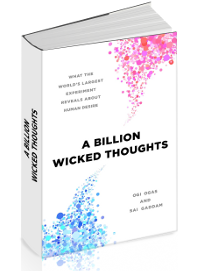 A new book entitled A Billion Wicked Thoughts: What the World’s Largest Experiment Reveals About Human Desire purports to have revealed profound differences between the sexual brains of men and women.
A new book entitled A Billion Wicked Thoughts: What the World’s Largest Experiment Reveals About Human Desire purports to have revealed profound differences between the sexual brains of men and women.
Two young cognitive neuroscientists who met as graduate students at Boston University, Ogi Ogas and Sai Gaddam claim to have studied the secret sexual behavior of more than a hundred million men and women around the world by observing what people do within the anonymity of the Internet. Alfred Kinsey, by comparison, personally interviewed some 18,000 subjects (middle-class Caucasians) in the 1950s.
Ogas and Gaddam reached these fantastic figures by analyzing a billion web searches, a million websites, a million erotic videos, a million erotic stories, millions of personal ads, and tens of thousands of digitized romance novels. Making use of sex research, evolutionary psychology and comments posted on pornography hubs and other websites, Ogas and Gaddam cooncluded that “men’s brains are designed to objectify females.” Since men’s chief concern is with the biological fitness of women for childbearing, they are programmed to easily feel desire for that which is visible to the naked eye: “The shapely curves of female ornamentation indicate how many years of healthy childbearing remain across a woman’s entire lifetime.”
Women, on the other hand, Ogas and Gaddam stated, have a unique neural structure contrived by evolution to protect them against the risks of reckless sex and to ensure that their partner would be a “strong and decent men willing to invest in a stable, long-term, child-rearing relationship.” This structure “inhabits a woman’s conscious mind and intercepts signals coming from her body, preventing them from triggering conscious, psychological arousal.” In other words, physical arousal and psychological arousal in men are united, while in women, the two are separate.
One wonders if the authors’ conclusions based on web searches accurately reflect those portions of the world’s population who do not surf the web for porn (or do not surf the web at all). And whether the comparison of a selective population of porn-users to an also selective group of female readers of romance novels would measure up in academic research settings.